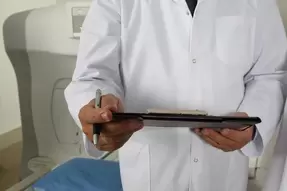|
An interview with Jacqueline Myers, BSP, Academic Detailer, RxFiles and Pharmacist, Infectious Diseases Clinic, Saskatchewan Health Authority – Regina Area. RxFiles is an academic detailing program that provides objective, comparative drug information to clinicians. Jackie’s work at RxFiles includes academic detailing and resource development. by Anna Morgan, MPH, RN, PMP, NaRCAD Program Manager Tags: COVID 19, Conference, Detailing Visits, Substance Use  Anna: Hi Jackie! We’re excited to feature your work as a detailer. How did you first become involved in academic detailing? Jackie: RxFiles has a bit of a celebrity following in Saskatchewan. The RxFiles books, which are packed with resources and drug comparison charts covering various clinical topics, are a coveted possession. You receive one book for free as a pharmacy student and everyone looks forward to that day because it has all the study material you could ever need in one place! I think it’s a dream of pharmacy students to get involved with RxFiles at some point in their career. I started with RxFiles in 2019 while working within the Saskatchewan Health Authority (SHA) Opioid Stewardship Program (OSP). A partnership was formed between the OSP and RxFiles and I was able to work both as a clinician at the Regina Chronic Pain Clinic and as a detailer providing education and creating content for RxFiles. My role in SHA has since changed, but I’ve continued detailing for the RxFiles team.  Anna: Your passion for academic detailing is palpable. You could tell how much you love academic detailing during your presentation at NaRCAD2020. Can you tell us a little bit more about why this work is so important to you? Jackie: It excites me to hear that--I’m so glad people see that I’m passionate about this. I’ve always admired musicians and artists for their passion, but I’ve never pictured myself as one of those people. Many healthcare professionals - nurses, pharmacists, physicians, physiotherapists – we all go into this field because we like or love working with people. I’m no different than any other healthcare professional. I also really love to learn and then share that knowledge through teaching or mentoring. Academic detailing is such a cool combination of those things. You get to learn about a specific clinical topic, share your knowledge with another clinician and ultimately improve patient outcomes. It’s a really special process. Anna: You’re absolutely right – it is special! What kind of support has been most helpful for you in becoming such a successful and passionate detailer? Jackie: When I first started with RxFiles, the rest of the team was working on topics other than opioid prescribing which left me feeling a bit isolated. Luckily, RxFiles has a great support system. My colleague Debbie, who I now consider my mentor, has been a huge resource for me. Even though we weren’t detailing on the same topic, I knew I could always talk through key messages with her, as well as recruitment strategies and other tips for approaching prescribers in our area. I still know that I can always go to her for a debrief at the end of a visit, whether it’s a successful visit or a mess of a visit. Academic detailing has the potential to be really isolating, so having someone who understands and can help guide you through some of your challenges can be so beneficial.  Anna: We know that academic detailing can be isolating, so it’s wonderful to hear how supportive your team is. On the days when you’ve had hard visits, I’m sure it’s difficult to feel that you’ve made an impact. How do you know that you’ve been successful in a detailing visit? Jackie: At the 2019 NaRCAD Conference, I was amazed by the presentations and the data that different programs had collected to measure impact. When I first started detailing, I was very focused on the clinician I was detailing committing to make a change or doing something differently in their practice. Then I began to learn that success in academic detailing comes in two forms. One is making an impact that changes a clinician’s practice and the second is establishing a connection and developing a relationship with a clinician. Sometimes making a connection will come first and then lead to making an impact, or sometimes they’ll occur simultaneously. Those are the two ways that I define success for myself in academic detailing. Anna: That’s spot on – those are two of the main goals of academic detailing. Can you share any success stories from the field from a time when you felt you made an impact?  Jackie: Of course! We are currently working on a special project to increase the number of buprenorphine/naloxone, or Suboxone, authorized prescribers in our province. One of the physicians I detailed was not yet authorized to prescribe buprenorphine/naloxone. He was a hospital physician and worked in internal medicine. He shared with me that he’d been thinking about becoming authorized and was apprehensive, but he saw a need for it in his patient population. A lot of his patients were being admitted for various diagnoses but would also have a concurrent substance use disorder that went unmanaged or ignored. After our detailing session, he reached out to me. He described a patient that he had admitted for an infectious process who also had opioid use disorder. He said, “before our conversation, I would have normally treated the infection and probably ignored the opioid use disorder. It’s possible the patient may have left against medical advice, and I would have thought, ‘that was their choice, and I did my best.’ ” After our detailing visit, he felt that he had the courage and the skills to discuss the patient’s opioid use disorder with them and think about what he could do as a physician to keep the patient comfortable and safe while they were in hospital. This honest conversation led the physician to speak with an authorized prescriber who was able to initiate the patient on buprenorphine/naloxone while they were admitted in the hospital. Even though the ask for this detailing project was to increase authorized prescribers, which he has not yet become, the interaction I had with this physician still led to a positive patient outcome and a better patient experience. Anna: Thank you for sharing that - it’s so nice to hear stories from the field. Even if you don’t accomplish the messaging you were sent out to do, you’re still making an impact. Can you share a story where maybe you weren’t as successful and how were you able to bounce back from a situation that was challenging for you?  Jackie: During COVID, a physician reached out to request a virtual visit. We started our detailing session and I was beginning my needs assessment. I started asking about his practice and his familiarity with buprenorphine/naloxone. He said, “that’s a new weight loss drug, right?” From that point on, he was really sad that I wasn’t there to talk about a weight-loss drug. He was disinterested and I could tell he was distracted. I could hear him moving around papers through the phone and I could hear people talking in the background. I said, “if this is not a great time for you, we can definitely rebook” but he insisted that I continue. I could feel myself getting frustrated, but I finished the visit. I was able to deliver my key messages, but I left the visit not feeling great. There was no commitment to action or change and we didn’t build a connection. I felt like I wasted both of our time. In order to bounce back from something like that, I think you need to acknowledge that it will happen sometimes and debrief with colleagues who have been in your shoes. Then just pick yourself up and try again. Anna: That’s great advice. It can be discouraging to have a visit like that, especially if your new in the field! One last question to wrap up - do you have any personal academic detailing goals for this upcoming year? Jackie: Yes! I was previously detailing on only opioid-related topics. This year, my role has changed a bit and I will be detailing on various clinical topics and in a new geographical area with all new clinicians. My primary goal is to connect and build relationships with these new clinicians. Fortunately, I’m taking over for a cherished detailer who is retiring and will help provide a warm handoff. My secondary goal, which is a bit sillier, is to avoid troubles on the highway when we begin in-person visits again. The detailer I’m taking over for has had some very interesting car trouble heading out to his detailing visits. He’s met a lot of wildlife and his car was even once fried by lightning! Anna: We certainly hope you’re able to avoid those highway issues! Thanks so much for chatting with us today, Jackie. Your stories are inspiring, and we can’t wait to connect again and hear about all your 2021 accomplishments. Have thoughts on our DETAILS Blog posts? You can head on over to our Discussion Forum to continue the conversation!  Biography. Jackie graduated from the University of Saskatchewan with her Bachelor of Science in Pharmacy in 2012. She has practiced in numerous clinical settings including community pharmacy, long term care, and hospital in the areas of internal medicine and opioid stewardship. Jackie is currently involved in the management of people living with HIV and substance use disorders at the Infectious Diseases Clinic in Regina. She also works with RxFiles providing academic detailing services and resource development. Comments are closed.
|
Highlighting Best PracticesWe highlight what's working in clinical education through interviews, features, event recaps, and guest blogs, offering clinical educators the chance to share successes and lessons learned from around the country & beyond. Search Archives
|
